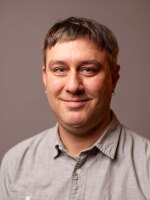A new face has been showing up on the Seattle jazz scene lately. As live music continues to emerge from pandemic closures, Freddy Fuego is emerging as a versatile musician with a lot to share.
In a KNKX interview for The New Cool, the multi-instrumentalist discussed working his way into the Seattle jazz community and the many musical projects in which he's currently involved.
"I don't want to be a professional musician"
Freddy "Fuego" Gonzalez grew up in New York listening to hip-hop and making beats. He first joined the horn section of a New York hip-hop band.
"I was around a lot of great music, great grooves, DJs making samples, and I thought 'that's cool, I could do that!' So, I picked up a computer and started making beats to practice over," explained Fuego.
Although his family is full of musicians, including an uncle who played with Cuban singing star Celia Cruz, Fuego didn't think a career in music was for him.
"My dad was always listening to Coltrane, and as a kid I would ask him to stop. Now, I'm playing 'A Love Supreme' at my shows!"
Fuego said his family encouraged him to apply to Berklee College of Music when he was in high school, but he told them he didn't want to be a professional musician. He began pre-law studies at Fordham University.
"But I was spending all of my time going to jam sessions, recordings, playing and writing music," Fuego said.
Playing in a late-night jam in 2006 at the iconic Blue Note club convinced him that the world of music held some promise, so the next year he turned to jazz studies at Berklee.
The real jazz education, Fuego said, came from bouncing around jam sessions in New York City. He also earned a degree at The New School with mentors including bassist Reggie Workman and saxophonist Jane Ira Bloom, who trained him in composition.
Going beyond fusion
As a trombone player, Fuego said he often found himself overlooked. But that also led to finding his own musical personality.
In earlier days with hip-hop bands, he would emulate rapping freestyle on his trombone. Mixing that hip-hop modernism with his Puerto Rican roots and a love of funk and soul formed Fuego's style, while collaborations inspired his writing.
"I would always hire people who were better than me," he explained, "then give them an idea and let them run with it. Something I thought was cool, they would make it cooler."
In modern jazz terms, Fuego says his music is beyond fusion.
"Music is evolving. I think the most successful jazz that's happening now are people who allow the audience to connect to the music."
Expressing his desire to escape genre, Fuego said the music doesn't need a label. "It doesn't have to be anything. It can just be," he said.
Film scores first brought him to Seattle
Fuego's love for storytelling through music led to a master's degree at Berklee in film scoring and a brief 2017 internship with film composer Ron Jones (Family Guy, Star Trek the Next Generation, etc.) in Stanwood, Washington.
"I really love movies," he said. "The best movies tell that story and can be timeless but also relevant to an era. I try to do that with my music."
"I would come to Seattle and go to the jam sessions, see different parts of town and meet different musicians like I did in New York," Fuego shared.
Upon his return to the Northwest in 2018 to teach at Seattle JazzED, he further cultivated his place in the jazz community.
Fuego ran into Seattle bassist, singer and band leader Marina Christopher who told him, "Hey, you look like you can play!" Fuego said her gig was the first he played in Seattle and that they're still working together.
Through Christopher and her band, Fuego was also introduce to saxophonist Frank Vitolo who would become a close friend. Oddly, Vitolo left Seattle to study and play in New York.
"We joke all the time, we traded cities," Fuego said.
Releasing a new album, film projects and a funk big band
Fuego made his debut recording in 2011 with The New York Chapter, which included friends who've since become stars like saxophonist Melissa Aldana and Grammy-nominated violinist Curtis Stewart. You can hear him on albums from the Wu-Tang Clan and Alejandro Sanz.
Recording his second album kept Fuego busy during the early isolation of the pandemic. He expects to release that record in the fall.
The album's first single, "Paradigm Shift" is Fuego's response to the upheaval of the pandemic. He said he's trying to change the way he looks at music.
"Rock, cinematic orchestra, hip-hop, reggae, disco, funk...music doesn't have to be in a genre to tell a story. If you're thinking of a Venn diagram of genres, I'm trying to live in the overlap."
Fuego still works in film music, as heard in the Crosscut documentary "Senior Year Was Crazy." He's also busy putting together a funk big band in Seattle.
"We're looking to support musicians of color," Fuego said. "It's mostly Black, Latino, Asian musicians playing Curtis Mayfield, Fela Kuti, Jimi Hendrix...everybody loves 15 horns in a room, why not?"
Later this month, catch the six-piece Freddy Fuego band at the Seamonster Lounge in Wallingford. The July 27 show will include Christopher on bass, Chris Patin drumming, Ian Hughes on guitar, Joey Walbaum at the keys and saxophonist Mike Jedynak.
The New Cool airs Fridays at 9 p.m., hosted by Abe Beeson and produced by KNKX Public Radio in Seattle, Wash.








